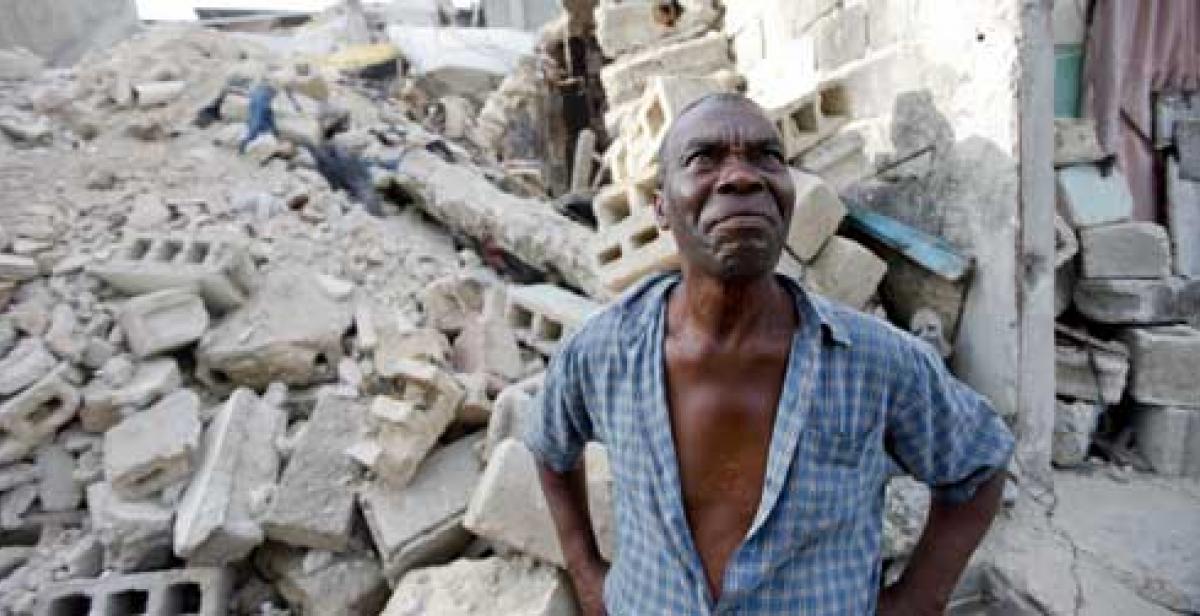Six months after a devastating earthquake rocked the Caribbean nation of Haiti, killing up to 300,000 people and displacing a million more, Progressio says that there are no “quick fixes” to overcome the catalogue of development challenges which must be addressed before the country can set itself on the road to recovery and long-term prosperity.
Hundreds of thousands of Haitians continue to live in makeshift camps in the capital Port-au-Prince, in the badly hit regions of Leogane and Jacmel, and in many rural areas, following large-scale movements of people after the January 12 tremor – the worst quake to hit the country in over 200 years.
In addition to addressing the vital and ongoing humanitarian needs – which require immediate attention; including the delivery of food and water to camps, urgent improvements in sanitation for camp dwellers and improved access to medicine – Progressio says the foundations for a new Haiti can only be laid if key barriers to longer term development are tackled. These include:
- Building a strong and engaged civil society that supports the ongoing development and strengthening of a new Haitian state, to ensure it provides for the vast majority of its people;
- Adopting concrete measures to encourage effective political and economic decentralisation away from the Haitian capital, Port-au-Prince, including tackling the many issues around land reform;
- Identifying new ways to stimulate the jobs market and bring down unemployment;
- Creating effective programmes to reduce environmental vulnerability and protect against the impacts of future natural disasters, including reforestation of former woodland zones;
- Seeking new investment, particularly in the agricultural sector, to ensure Haitians are able to grow their own food and feed their population;
- Tackling increased levels of discrimination and violence against women and girls, which have reportedly spiralled since January 12.
Lizzette Robleto, Progressio’s Advocacy Coordinator for Latin America and the Caribbean, said: “While we are acutely aware of the ongoing humanitarian crisis in Haiti, which needs resolving and fast, the next six months must also be about setting the stage for the next chapter in the country’s reconstruction and development.
“It is no easy task. Haiti’s reality is unbelievably complex – this is still the poorest nation in the Western hemisphere. It needs targeted support, both from its own people and internationally, to ensure that it is able to build back better.
“That means not just new houses and new roads, but a new approach to development which serves the vast majority of the Haitian people.”
She continues: “We must set the ball rolling – these are big development challenges which could take several generations to effect – but they must be part of the longer-term reconstruction plan and they must be prioritised.”
In the weeks and months following the quake, Progressio staff and development workers played a key role in the Ayuda a Haiti (Help Haiti) platform, working alongside more than a hundred grassroots Haitian, Dominican and international organisations to coordinate local emergency relief efforts from the Dominican capital, Santo Domingo.
After January 12, Progressio development workers were also rapidly deployed to locally based partner organisations in Port-au-Prince and the badly hit town of Leogane, where they helped to coordinate emergency relief and have since been working to ensure the views, voices and concerns of local people are heard and acted upon in the ongoing crisis.
Photo: Wilbert Joseph's house was completely destroyed in the earthquake and he has moved in with extended family. He gradually continues to remove the debris with a shovel and wheelbarrow. Haiti, June 12, 2010. (Photo © Natasha Fillion/Progressio)
Notes to Editors
- To arrange an interview with Lizzette Robleto, contact Jo Barrett, Progressio’s Media Officer on 0207 288 8619 or 07940 703911
- Progressio has worked with local partner organisations in Haiti, particularly in and around the border areas with the Dominican Republic, for more than 15 years.



